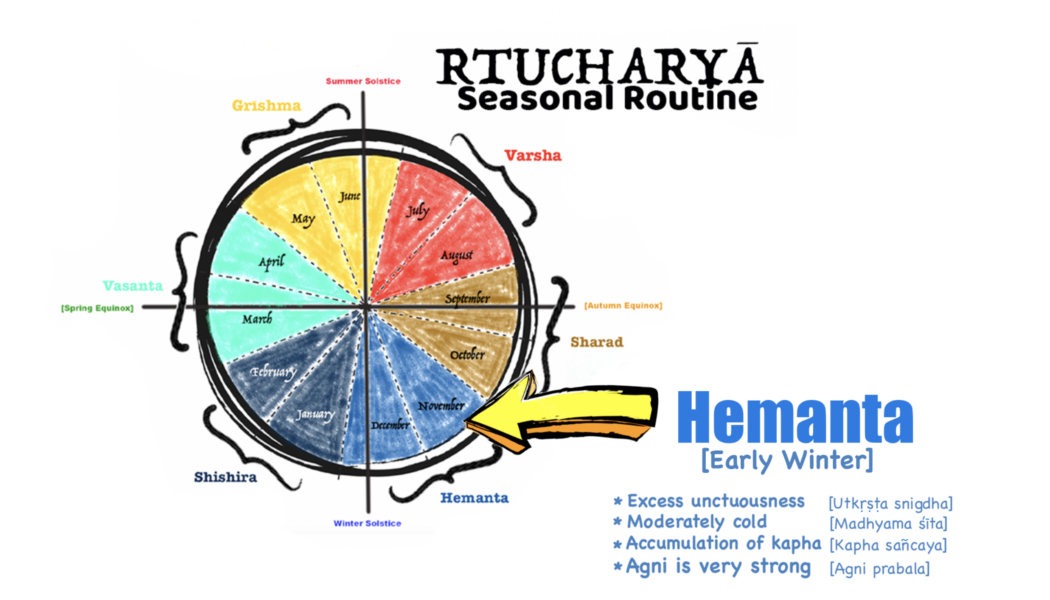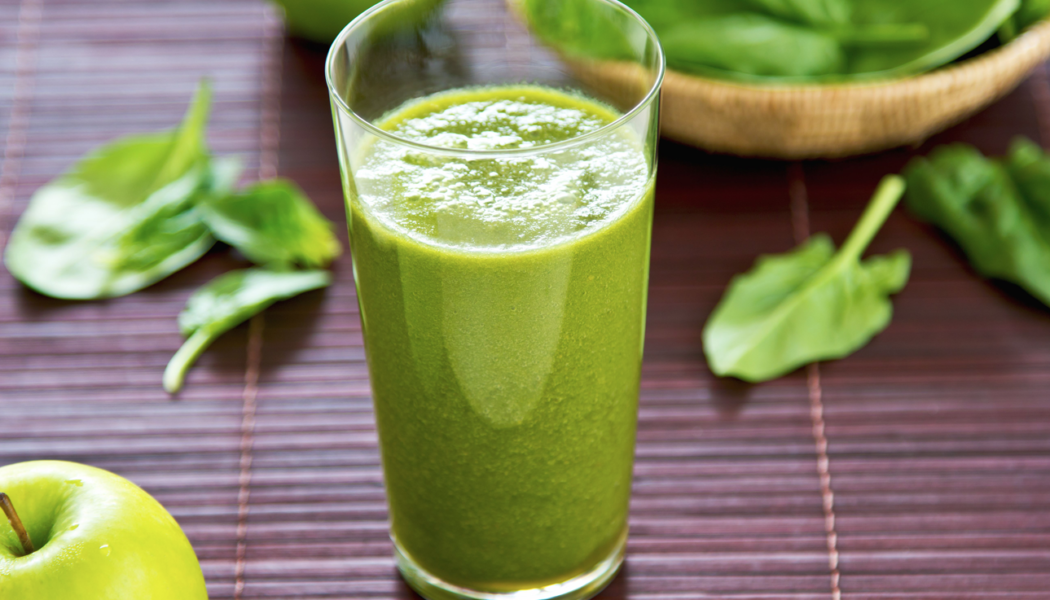Ayurvedic
Ayurveda Guide For Late Winter Season
Ayurveda Guide For Late Winter Season Ayurveda explains that whatever there is within the environment is also there within the human body and that such changes within the environment have an influence upon the body. During this time of year, the qualities of nature become excessively cold & excessively dry and therefore influence the body as such. Essentially, keep doing what you’re doing BUT more so … Meaning, it’s advised to continue the same regimen of early winter during late winter. For example, having meat soup prepared from well-nourished animals with the addition of fat; such as ghee. Having alcoholic drinks made from jaggery and consuming other food made of wheat, black gram, sugarcane and milk products are ideal during winter season. It’s also...
Ayurveda Guidelines for Early Winter Season
Early Winter Season Hemanta [early winter] is a pleasant transition from the excess dryness of autumn. Hemanta provides unctuous & cold qualities into the atmosphere. “Whatever there is in the environment is also there in the human body” The Sanskrit word “Rtu” means the seasonal movement of time, while “Charyā” means routine or lifestyle. Therefore, ‘Rtucharyā’ means a seasonal routine or seasonal lifestyle. – Dr. Vasant Lad During this time of the year [i.e.Visarga Kāla] it’s hydrating as the power of the Sun becomes less … and the gentle qualities of the moon become more predominant. The qualities of early winter [hemanta] are excessively unctuous [utkrsta snigdha] and moderately cold [madhyama śīta]. Increased Agni = Increased Hunger & Appetite Very St...
Digestion According To Ayurveda
Disclaimer: All content included on this website (including, but not limited to, images, photos, graphics and text) is the property of ‘Healthy Ayurveda’ and ‘Vedic Sage’ and as such is protected by US and international copyright and other intellectual property laws. Digestion According To Ayurveda The fundamentals of Ayurveda is centered around digestion and takes into consideration: Rasa: the 6 differing tastes … which are sweet, sour, salty, pungent, bitter and astringent Virya: the potency or power contained within food and/or medicine Vipaka: the influence of food at the tissue level once digestion within the GI tract is complete Prabhava … which will be discussed further in another post According To Ayurveda … Every substance is ...
The Ayurveda Guide: Spring Season
The Ayurveda Guide: Spring Season The shift to springtime weather and energy has begun. Fickle, changing hot-and-cold days send mixed signals to the body. This natural weather flux demands more flexibility in the body, because the body senses the shift of seasons on a cellular level and begins a natural detox. Many of us experience that, during the cold weather, we tend to eat more. Eating more then is natural, as it is Vata-pacifying (Vata is the mind-body operating principle that governs movement and is associated with fall and winter). The extra weight naturally keeps us warmer and feeling more comfortable in the cold winter months. Ayurveda honors that change within … We have all had the experience of feeling cold when we have missed our main meal. Food is the fuel that al...
The Making Of “Dr. Vasant Lad Documentary”
Dr. Vasant Lad Documentary The term ‘Upanishad’ literally means, “sitting down near” or “sitting close to”, and it implies listening closely to the mystic doctrines of a guru or a spiritual teacher, who has realized the fundamental truth of life. It has been said that the best teachers teach from the heart and not from the book. To many, Dr. Vasant Lad is just that, a guru and a spiritual teacher. Dr. Lad is both a physician and professor who is considered one of the foremost expects on the subject of Ayurveda. Each year, Dr. Lad travels throughout the world, consulting privately and giving lectures. Coming to the United States in 1979 and lecturing for over 30 years, Dr. Lad has influenced and touched the hearts of his students. Rare are the teachers who affect eternity, never knowing whe...
How To Easily Make Delicious Kitchari
How To Make Kitchari For its easy digestibility and flavored simplicity, kitchari has long been valued in nearly every indian household. Despite its name in hindi, which means “a mess” or “all mixed up”, India’s traditional science of Ayurveda considers this dish to be nourishing and is often used as part of its seasonal cleansing programs [i.e. Panchakarma]. Not only is kitchadi nourishing but with certain spice combinations, kitchadi can also greatly help to improve digestion. Kitchari Kit This kit provides all the basic supplies you need to make Kitchari for 7 days. The Spice Of Life Spiced generously or by adding extra ginger you can make kitchari a simple lunch on a cool autumn or winter afternoon. Likewise, the addition of ghee [clarified butter] garnished with fresh cilantro and a ...
Amrit Kalash – The Nectar Of Immortality & The Queen Of Ayurvedic Formulas
Amrit Kalash – The Nectar Of Immortality According to Indian mythology, during the ancient of times there was much suffering amongst humanity. The gods and demons [Devas & Asuras] got together and made a solemn oath to help resolve the origin of all suffering. Together they entered the depths of the ocean and churned the water to produce the most precious gift – Amrit Kalash. Amrit Kalash is thought to be the ambrosial gift to bring about health and happiness for all of humanity. Amrit Kalash Traditional ayurvedic formula of 13 herbs that supports the health of mind, brain, and nerves; increases vitality and inner strength; powerful antioxidant — research shows it to be up to 1,000 times more effective than vitamins C and E The Queen Of All Ayurvedic Formulas Amrit K...
3 Health Reasons Why You May Not Want To Drink Smoothies – An Ayurvedic Perspective
3 Reasons Not To Drink Smoothies While your immune boosting superfood smoothie may be chock-full of nutrients, power-packed with vitamins, and loaded with antioxidants it may actually be adding undue burden to your digestion and overall health. There is no denying the sense of clarity and lightness one feels from eating raw food. However, many raw food enthusiast have attested that over a period of time there is often a sense of ungroundedness that develops and the science of Ayurveda has just the explanation for this. “All disease begins in the gut.” – Hippocrates 1. Smoothies Are Difficult To Digest The process of eating, according to Ayurveda, is metaphorically similar to a burning fire. The whole aim of Ayurveda is to balance this digestive fire so that we can ...















